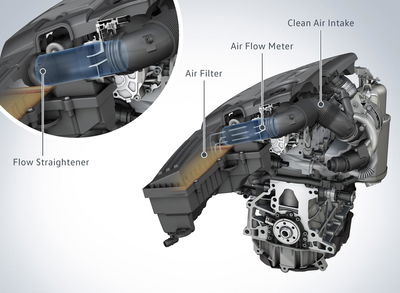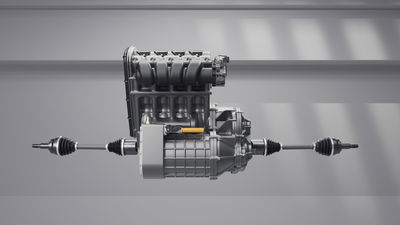This Is How Volkswagen Is Fixing Europe’s Dieselgate Cars
Here’s the moment VW diesel owners have been waiting for. The under-fire manufacturer has just revealed how it intends to fix the Europe-based diesel engines that were found to feature a ‘defeat device’, which would trick testing equipment into reading low nitrogen oxide (NOx) levels. The company has been working on 1.2-, 1.6- and 2.0-litre versions of the EA 189 engines to find ways to bring NOx levels below the regulatory limit, while targeting no “adverse effects on the engine output, fuel consumption and performance.”
The first outcome of those efforts has now arrived in the form of a technical measure to be applied to the 1.6-litre engine. Here’s Volkswagen’s official explanation for the modification:
A “flow transformer” will be fitted directly in front of the air mass sensor on the 1.6-litre EA 189 engine. This is a mesh that calms the swirled air flow in front of the air mass sensor and will thus decisively improve the measuring accuracy of the air mass sensor. The air mass sensor determines the current air mass throughput, which is a very important parameter for the engine management for an optimum combustion process. In addition, a software update will be performed on this engine. The time needed for the implementation of the technical measures is expected to be less than one hour.

The upgrade has been accepted by the Federal Motor Transport Authority, and Volkswagen is currently in the process of figuring out the recall process for each European country. The first batch of recalls are expected to start in January 2016, while the rest of the engines are expected to be sorted by the end of the year. VW has also promised to provide a courtesy car to anyone who requires one while the work is being carried out, however it shouldn’t take more than an hour to fit the part.
As for the 2.0-litre engine, customers will be able to pop into their dealer once the recall has been issued to receive a free software update. The same is expected for 1.2-litre variants, but VW is waiting for confirmation of this. If you’re the owner of one of the VW Group’s other affected brands - Audi, Seat and Skoda - you can expect similar information soon.
Although Volkswagen is targeting no adverse effects on the car’s economy or performance, it says that the different applications of the engines across its range mean that it can’t confirm whether it has achieved this yet. It’ll be interesting to see exactly what effect these measures will have in the real world, and more importantly for the bean counters, whether owners start ditching the brand when it’s time to get a new car.













Comments
what about porsche diesels?
Nobody cares about them. (They are V6 aren’t they? Only inline 4s were affected)
I love how hypocritical people are. They act like this is a massive deal, like it will halve their lifetimes, and chances are, they smoke a pack of cigarettes per day… I have friends like that.
Slowing and restricting airflow at the intake will not affect engine performance… Yeah okay
Diesels increase power when you increase the fuel quantity than air flow .2.Intake restrictions can be altered in the software with a bit more boost (50-70mbar) .These restrictions matter most on N/A cars . Most customers of the recalled cars don’t care about power but only fuel economy or emissions .
So you’re telling me that VW could achieve low emission levels without affecting performance in the first place, using a 2 dollar mesh, but instead took a billion dollar risk through fraud? Yeahhhh right…
Either VW is lying once again but getting away with it cause it already paid the price, or they just discovered a miracle mesh
At they levels it will be 30 cents
Yeah it does seem like a curiously simple fix. I can’t wait to see these get fitted to customer cars and be tested by independent bodies. At the moment it seems a little too good to be true. On both the physical part and the software update, if it’s this (relatively) easy to do, why not just do that to begin with? I’m sure this isn’t the last we’ll hear from this story.
This new discovery wasn’t yet discovered back then …
Almost every other modern diesel engine has a mesh like that in front of the MAF sensor. If that is the reason why other diesels dont have a problem like the TDI and are technically superior, then they have a bigger problem… It is not just about the pollution, they lied to buyers and they were the ones who lobbied for more strict pollution norms so that the competitors would have to struggle so that they can achieve it, while WV took the easy way of cheating and lying. Not cool, and they should pay for that.
Well they didn’t say anything about power or efficiency. Power might be down 20% and fuel economy as well so that would explain it pretty easily. The little air guider they are using has been around since maf’s were invented for the exact reason he states so I’m confused why they seem to think it is so revolutionary.
It’ll be amusing to see this tested before and after, because I’m certain the software update will nerf the engine map and that bit of plastic will not make a squat of difference. I wouldn’t take my car in for the recall to leave with 10-15% less power.
Still not fixing mine, ‘cause ‘Merica
That’s the spirit!
what about mine, it has software tuning, and a direct air intake ^^
Calm the air before the turbo? That doesn’t sound right.
Calm/straighten the air before the mass air flow sensor for a more accurate reading.
so a spaghetti strainer fixes all problems?
Yeah more bull. Just pull that thingy out some time later, re-map the engine and enjoy your new performance!
Pagination